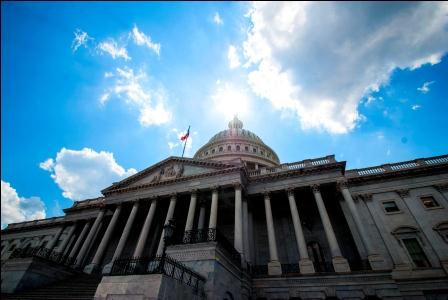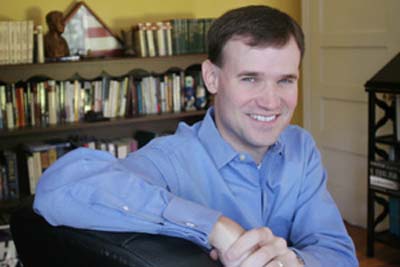“Do you presume to criticize the great Oz? You ungrateful creatures. Think yourselves lucky that I’m giving you audience tomorrow, instead of 20 years from now. The great Oz has spoken.”
Those are lines spoken by the title character in the 1939 film classic The Wizard of Oz. But to many citizens, they could just as well be the words of some elected officials in Washington, D.C. And while there is a perceived disconnect between ordinary citizens and the federal government, there is one Fort Worth-based firm whose business is to break down those communication barriers and assist its clients in having productive interaction with elected officials in the nation’s capital.
That firm is Corley Pipes Consulting, and since its founding in 2010 it has assisted its Tarrant County-based clients in navigating the complex world of Washington politics and regulation.
Scott Corley, 42, and Kasey Pipes, 44, each with impressive resumes of political experience, joined forces to establish Corley Pipes. Prior to co-founding the firm, Corley (the son of a minister who was the dean of the Southwestern Baptist Theological Seminary) spent five years as director of government affairs for Microsoft Corp., working directly with the company’s top management including Bill Gates and Steve Balmer. Before that, he was a key staff member for Rep. James Rogan (R-California) and Sen. George Allen (R-Virginia). Corley is a registered lobbyist.
Pipes began his career as an intern in the California office of former President Ronald Reagan. From 1997-99, he was communications director and senior legislative assistant to U.S. Rep. Kay Granger (R-Fort Worth). From 1999-2000, he wrote speeches and researched policy for the Bush for President Campaign. From 2001-03, hired by Karl Rove, he wrote speeches and provided policy research and analysis in the George W. Bush administration. In 2004, he was chief author of the National Republican Party Platform. In 2006, he was senior communications adviser to California Gov. Arnold Schwarzenegger.
Corley and Pipes both attended Southwest High School in Fort Worth, where they forged their initial friendship participating in Youth and Government and as members of the debate team. Corley went on to receive his undergraduate degree at Baylor University and a master’s degree in economics from Johns Hopkins University. Pipes received his bachelor’s degree at Abilene Christian University, a master’s in government from Johns Hopkins and a second master’s in journalism from Harvard University.
Continue Reading :: From the Fort Worth Business Press

The theory of evolution can be disproved, Henry Adams laughed, by tracing the presidents from Washington to Grant. While unfair to the 18th president, the joke underscores a serious point: Politics in Washington has seemingly gotten worse over time.
Perhaps no issue better demonstrates this than immigration reform. This one topic shows how politics often trumps policy in Washington, D.C. As Congress considers legislation to reform our immigration system, a few basic facts should guide the debate.
Most important among them, immigration law should be defined not by whether immigrants can enter America, but which ones. As a nation of immigrants, America will always open its door to others. But who gets to enter through those doors remains to be answered. Many other countries around the world shape their immigration rules so that immigrants who can do the most for their economies are allowed to enter first. The logic can’t be refuted: Immigrants should be welcomed based on what they can do, not based on who they are or where they are from. Where other countries offer a high-skilled immigration system, America essentially provides a low-skilled system. Getting a family visa is much easier than getting a high-skilled work visa.
 As a result, many of the world’s best and brightest young students come to American colleges where they are trained as engineers and scientists only to be kicked out of the country after graduation. And what do these brainiacs do when they return home? They create new products, new businesses and new jobs in their home countries.
Fortunately, a consensus is emerging that this policy makes little sense in the 21st century. Recent research from Professors Matthew Slaughter and Gordon Hanson shows that high-skilled immigrants in America have a profound impact on the economy.
“One quarter of U.S. high-technology firms established since 1995 have had at least one foreign-born founder,” the scholars found. “These new companies employ 450,000 people and generate more than $50 billion in sales. Immigrants or their children founded 40 percent of Fortune 500 companies.”
Simply put, high-skilled immigrants create jobs for Americans. Not only do academic researchers realize this, but so do political leaders on a bipartisan basis.
So, if the research confirms it and both parties want it, why is creating a high-skilled immigration system so difficult?
As a result, many of the world’s best and brightest young students come to American colleges where they are trained as engineers and scientists only to be kicked out of the country after graduation. And what do these brainiacs do when they return home? They create new products, new businesses and new jobs in their home countries.
Fortunately, a consensus is emerging that this policy makes little sense in the 21st century. Recent research from Professors Matthew Slaughter and Gordon Hanson shows that high-skilled immigrants in America have a profound impact on the economy.
“One quarter of U.S. high-technology firms established since 1995 have had at least one foreign-born founder,” the scholars found. “These new companies employ 450,000 people and generate more than $50 billion in sales. Immigrants or their children founded 40 percent of Fortune 500 companies.”
Simply put, high-skilled immigrants create jobs for Americans. Not only do academic researchers realize this, but so do political leaders on a bipartisan basis.
So, if the research confirms it and both parties want it, why is creating a high-skilled immigration system so difficult?
One word: politics. Republicans overwhelmingly support expanding high-skilled visas. But they would rather do that and not address other issues like the status of undocumented workers. Meanwhile, Democrats prefer to deal with undocumented workers first and will only consider the high-skilled visa issue as part of a comprehensive immigration package. The result? Politics triumphs over policy.
Full disclosure: Our firm represents a coalition of technology companies, including some with Texas operations, that is lobbying in Washington for more high-skilled visas. We are intensely involved in the legislative discussions and believe this could be the moment when the gridlock ends and good policy begins.
High-skilled visa reform represents a rich quarry that Congress should mine so that the U.S. economy can grow and create jobs. That would be good policy for America and good news for Texas businesses.
Kasey S. Pipes is co-founder and partner of Corley Pipes, a government relations firm based in Fort Worth with offices in Washington, D.C. He previously served as an adviser to President George W. Bush, Gov. Arnold Schwarzenegger and Congresswoman Kay Granger. He can be reached at kasey@corleypipes.com
From the Fort Worth Business Press


 As a result, many of the world’s best and brightest young students come to American colleges where they are trained as engineers and scientists only to be kicked out of the country after graduation. And what do these brainiacs do when they return home? They create new products, new businesses and new jobs in their home countries.
Fortunately, a consensus is emerging that this policy makes little sense in the 21st century. Recent research from Professors Matthew Slaughter and Gordon Hanson shows that high-skilled immigrants in America have a profound impact on the economy.
“One quarter of U.S. high-technology firms established since 1995 have had at least one foreign-born founder,” the scholars found. “These new companies employ 450,000 people and generate more than $50 billion in sales. Immigrants or their children founded 40 percent of Fortune 500 companies.”
Simply put, high-skilled immigrants create jobs for Americans. Not only do academic researchers realize this, but so do political leaders on a bipartisan basis.
So, if the research confirms it and both parties want it, why is creating a high-skilled immigration system so difficult?
As a result, many of the world’s best and brightest young students come to American colleges where they are trained as engineers and scientists only to be kicked out of the country after graduation. And what do these brainiacs do when they return home? They create new products, new businesses and new jobs in their home countries.
Fortunately, a consensus is emerging that this policy makes little sense in the 21st century. Recent research from Professors Matthew Slaughter and Gordon Hanson shows that high-skilled immigrants in America have a profound impact on the economy.
“One quarter of U.S. high-technology firms established since 1995 have had at least one foreign-born founder,” the scholars found. “These new companies employ 450,000 people and generate more than $50 billion in sales. Immigrants or their children founded 40 percent of Fortune 500 companies.”
Simply put, high-skilled immigrants create jobs for Americans. Not only do academic researchers realize this, but so do political leaders on a bipartisan basis.
So, if the research confirms it and both parties want it, why is creating a high-skilled immigration system so difficult?

